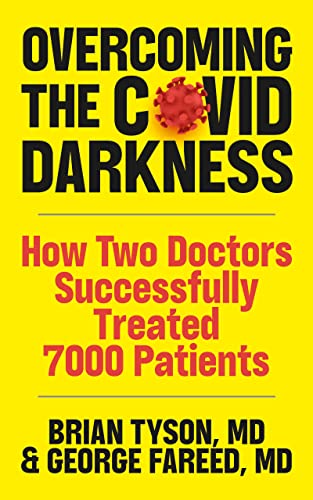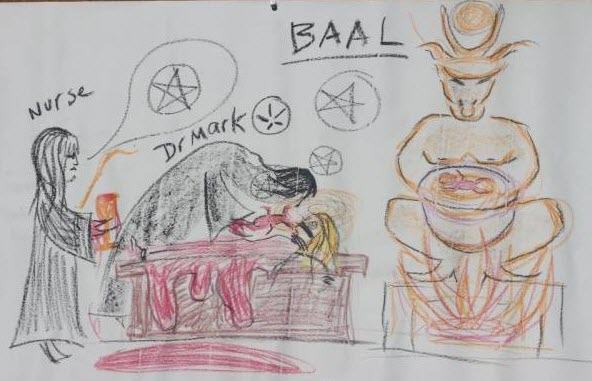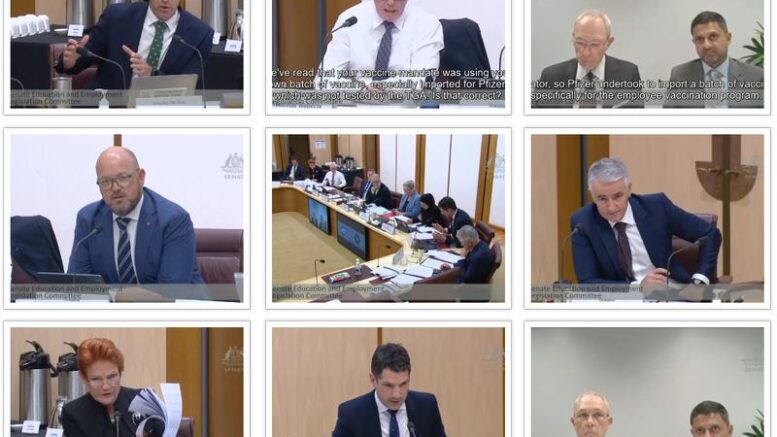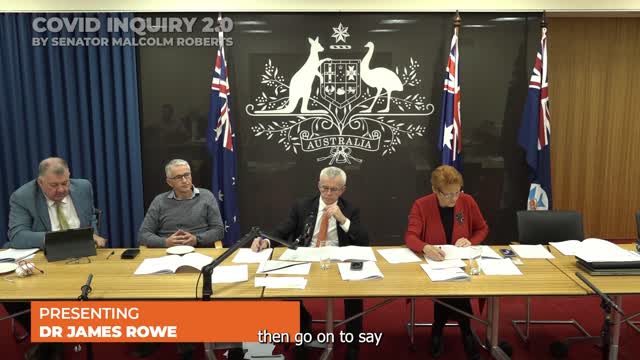Malcolm Roberts:
Thank you very much for appearing Dr. Brian Tyson. We welcome you. We have scanned information-
Brian Tyson:
Absolutely.
Malcolm Roberts:
… So if you’d like to expand on your introduction. You’re a U.S. clinician, author of the book Overcoming the COVID Darkness that’s currently a U.S. national bestseller. You’ve been working on the front lines in one of the country’s hardest hit areas in the state of California. I think Imperial Valley, if I remember from a previous conversation-
Brian Tyson:
That’s correct.
Malcolm Roberts:
… and your clinic has treated 10,000 COVID-19 patients with only seven deaths, so you’re going to speak on early treatments and outcomes. Over to you. Thank you very much.
Brian Tyson:
Wonderful. Thank you guys. I’ve been on the frontline since the COVID-19 pandemic came out in Southern California. It was early March. We started the first evaluation and treatment centres I would say probably nationally and even internationally. We took the test-and-treat approach from the very beginning as we knew the SARS coronavirus from 2003 was pretty deadly on a respiratory side.
Brian Tyson:
I was having problems with not really hearing anything on the lungs, but the patients were really describing a really hard time breathing with shortness of breath and chest pain. We started doing chest x-rays early on, and I was one of the first to notice the patchy consolidation pattern that we saw with the inflammatory response from coronavirus. That prompted us to use multiple drugs in the treatment of COVID-19, and I say that with very specificity, multiple drugs. Not just one drug. There is no silver bullet. It was a clinical decision using signs, symptoms, and chest x-ray findings, and the reevaluation approach that we took was if we found somebody who we thought had coronavirus because initially we didn’t even have testing… We thought we had somebody with coronavirus, the chest pain, the shortness of breath, some had fevers, some didn’t really have fevers.
Brian Tyson:
We started them on hydroxychloroquine, Zithromax, and zinc. We reevaluated those patients two to three days later to see if it had any effect. Some people got over it really well. Some people came back, and we would repeat their chest x-rays, and we started to see the inflammatory response, so therefore we went the asthma approach, and we started using Albuterol, Atrovent, and inhaled Budesonide as well as shots of Dexamethasone or Solu-Medrol at the time as well depending on what we had available.
Brian Tyson:
Again, treating symptoms. Patients complaining, “I can’t breathe,” pulse oximetry was going down. It sounded a lot like asthma, so we started treating like asthma, and low and behold, those patients also got better. Even though initially they may not have responded to the first round of treatment, a second round of treatment sometimes would clear the infection, and it would also clear the chest x-rays, so it’s the multi-drug approach that we’ve always taken with viral illnesses, especially respiratory viral illnesses.
Brian Tyson:
I’ve been around the ER for 14 years. I was also a hospital medicine doctor. I’ve treated patients in the hospital in the ICU. I was a medical director of [inaudible 00:03:43] healthcare at St. Bernardine’s. We ran the top one out of their 50 programmes in Southern California, so I’m familiar with all stages of disease. I’ve done vent management as well as emergency room management for all sort of illnesses.
Brian Tyson:
It’s not a coincidence that my success was what it was. It was something that I’ve always learned, which is observe what’s going on, collect your data, make an assessment or a diagnosis, treat it, reevaluate it, and see does that work or not. Well, here we are two years later, 10,000 patients treated, seven fatalities, but three of those fatalities were on the same day they presented to my clinic. Pulse ox in the sixties. We sent them straight from my clinic to the hospital. Those patients didn’t make it. They didn’t get treatment. It was just something that we report because, again, patients who report to my clinic, they all got counted in our data. The four that were not that did receive treatment, none of those patients presented before day seven, when it looked at our studies, so anybody who came to our clinic from day zero to seven and got treatment, those patients all survived. Those who reported to our clinic after day seven, we lost four of them.
Brian Tyson:
Two of the patients that we lost ended up getting admitted to the hospital, taken off treatment. One died six weeks later. The other one died three weeks later. One patient just completely didn’t respond to anything we gave them, and unfortunately we lost that patient.
Brian Tyson:
But when you look at 10,000 successful plus treated patients using the multitude of medications that we’ve used, you can’t say or nobody can say that that’s just by chance. As the data would come in we found that vitamin D3 was added when the studies showed that low vitamin D levels were associated with a higher mortality rate, so we added in vitamin D3.
Brian Tyson:
We’ve always used the vitamin C and zinc like we would with any influenza outbreak. Then when the Ivermectin studies started coming out, and we heard about that in October… It was like August, September, October of 2020… We incorporated Ivermectin into our protocol. That was before vaccines were even available. I personally and my wife got COVID in October of 2020. We used the cocktail and immediately saw a huge difference from one day to the next. Both me and my wife were over the illness in three days.
Brian Tyson:
I could tell you, too, that I’ve been personally exposed to thousands of COVID-19 patients. I can tell you that natural immunity is robust and strong because I have yet to be reinfected, and here we are over two years later. That’s something else I can bring to the table is our employees, when we look at our employees in reinfection rates, the only ones who have been reinfected are those who had COVID, got vaccinated, then got COVID again. When we’re talking about 120 employees, everybody on our staff has been COVID positive. They’ve all survived clearly with our treatment protocol. When monoclonal antibodies came around, we started using those as well, especially in the elderly. I think that was one of the biggest [inaudible 00:07:34] treatments that never got really publicised, even though they’ve been readily available.
Brian Tyson:
That was a big miss on the government’s end, but nonetheless, when we got them, we started those patients as soon as possible with giving them monoclonal antibody treatment and then we followed that up with our cocktail. As far as a clinician, we saw over a hundred thousand visits between my three urgent cares in the last two years. We’ve treated over 10,000 patients successfully. We have had no overdoses or adverse events from using the cocktail. We have lost only the four patient who were eventually admitted to the hospital, and that’s our success. That’s pretty much who I am.
Malcolm Roberts:
Thank you very much, Dr. Tyson. Do you have questions, Craig?
Craig Kelly:
Yes. Dr. Tyson, of those 10,000 patients that you’ve seen, do you have any numbers of a comparable 10,000 patients in your particular area somewhere in California what you would’ve expected the results to be as far as number of hospitalizations and deaths to compare with your results?
Brian Tyson:
Yes, initially what we looked at it was at 3.6% mortality rate on the COVID patients in the Imperial County, so when you look at the same demographics, the same patients, it was whether they would show up to our clinic versus showing up to other clinics or the ER, our mortality rate was only .004%. So we’re looking at saving at least 1200 patients should have died had they’ve gone to our clinic when you look at numbers that we’ve treated.
Brian Tyson:
The hospitalisation rate would’ve been probably 10 to 20 times higher than what we saw. Again, when you compare apples to apples, and you’re looking at the same demographics, our oldest patient we treated successfully was 106. We’ve treated patients all the way down to six months old using, again, a variety of treatments. Not necessarily hydroxychloroquine in those age groups, but diabetics, morbid obesity, when you look at the Imperial County, diabetes is one of the highest rates out here. Morbid obesity is one of the highest rates out here. We’re dealing with a predominantly Hispanic population. Even education and access to medical care as a rural community was really hard.
Brian Tyson:
The story broke in The New York Times believe it or not because the hospital was flying out probably 10 to 12 patients a day that presented to the hospital because of the failed treatment of, “Go home and wait until you’re so sick to come back.” The lack of education from the public health sector to the patients on when it’s appropriate to seek treatment rather than telling patients there is no outpatient treatment, only inpatient treatment. Even at that time, Remdesivir was still problematic, and we didn’t even really know what the outcomes were going to be with that.
Brian Tyson:
It was a very scary and difficult situation. I decided to take out a loan for $250,000. We bought PPE. We bought tests from a company in Orange County that got them from Korea. We were seeing four to five hundred patients a day in the parking lot. That was the real test of we did, and we continue to see patients every day that continuously come back to the clinic because they know we’re the number one COVID treatment centre, probably in the United States.
Craig Kelly:
So you can clearly show you’ve saved all these lives using the hydroxychloroquine combined with other drugs. Yet here in the state of Queensland where we are, you would’ve been sentenced to six months jail as a medical doctor for prescribing hydroxychloroquine for COVID. What do you say about a governmental regime that would sentence a doctor like you to six months in jail by using hydroxychloroquine?
Brian Tyson:
The first question I would ask is what gives you the authority over me to say what I can treat patients with? Hydroxychloroquine has been around for 65 years in the pharmaceutical form and over 400 years in the natural form. We know it’s a safe drug. There’s not even a black box warning on the drug. It’s used all over Africa and Southeast Asia for the treatment of malaria. If a young kid and a newborn can get it for treatment of malaria, why does it make it so lethal in somebody with COVID? The answer is is doesn’t, so I find it malicious to say that if a doctor with a medical degree and the expertise that we’ve gained over the years of treatment from residency to med school to in-person treatment, what gives the government the right to overthrow that medical decision and relationship between me and my patient?
Brian Tyson:
That’s how new treatments are developed every single day. If not, things like aspirin would’ve never been used for heart attacks and stroke, or we wouldn’t have known that hydroxychloroquine actually also treats rheumatoid arthritis. When you look at off-label uses in paediatrics, it’s almost 80% of the drugs we use are off-label. Why? Because we don’t experiment on kids. How many drugs have been experimented on in the children that we use every day?
Brian Tyson:
Nobody can answer that question because they don’t experiment on kids. Expecting that you’re going to have a randomised controlled trial perfectly written in the middle of a pandemic while people are being the hospitalised and dying, it makes absolutely no sense. The reliance should have been on doctors like myself who have been treating patients in-person risking our lives every day to tell you, “Hey, this drug works. This doesn’t. We tried this. We got this outcome.”
Brian Tyson:
If I can show you a chest x-ray from the beginning of treatment to the end of treatment and that chest x-ray has cleared, I’ve proven that that treatment works, and I don’t need anybody outside of that to tell me that I’m wrong. I have a database that has over 10,000 patients on it. We kept every single patient that we treated on a spreadsheet.
Brian Tyson:
And guess what? Nobody from the government, other than the state of California when they came down to look at our data as far as the infection rates, has actually looked at that data. They don’t want the treatment data. They just wanted the patients who were positive data. But on that right hand column, it said exactly what we treated these patients with and their outcome after they were treated. So nobody can go back and say, “The data was made up.” Nobody can say, “The data’s not right.” Nobody can say that we didn’t do what we say we did because it’s all documented.
Craig Kelly:
Have you been able to get this message out about early treatment on social media or has social media tried to censor you on this?
Brian Tyson:
I’ve been banned on Twitter, so I’m not allowed to post on Twitter.
Craig Kelly:
So a medical doctor-
Brian Tyson:
I’ve been kicked [00:15:29]-
Craig Kelly:
… so as a medical doctor, someone from Twitter who was not a medical doctor has decided you should be banned.
Brian Tyson:
Yeah, exactly. I should be banned because I was asking questions. Everything that we’ve done as far as our group is simply asking questions, and the questions we’re asking nobody wants to answer. Why is it that I can’t as an expert in COVID early treatment because I am an expert in early COVID treatment, why can’t I post something on Twitter or Facebook without it being labelled or taken down or shadow banned?
Craig Kelly:
Do you think that-
Brian Tyson:
… Or labelled, “Ineffective,” How is what I’m doing labelled, “Ineffective?” It makes no sense to me.
Malcolm Roberts:
Steve, do you have any questions?
Steve Andrew:
Yeah, Brian. How are you, doctor?
Brian Tyson:
How are you?
Steve Andrew:
Yeah, very well. I’m the state member in Queensland. One of the only state members that tries to fight against the mandates and the vaccination protocol that we’ve actually rolled out now. As Craig was saying earlier, Mr. Kelly, concerning the penalties that come with [inaudible 00:16:47]. It was almost as if they had to take these drugs out of circulation so that they could invoke the emergency power so that these vaccinations could be the first line of defence.
Steve Andrew:
We were talking earlier about a whole heap of different things, but we’re going to extend the state of emergency next week for another six months and then an ongoing two years, and vaccination is the primary care or the primary way of being able to deal with this. They’re even pushing it to kids as young as five years old. They’re basically holding the state to ransom under mandates, stopping any sort of social events outside until people get vaccinated. They’re basically got the big stick approach. [inaudible 00:17:32] human rights have been thrown out the window.
Steve Andrew:
Any of the stuff that you’ve done, obviously, we need to try and bring this stuff forward. Surely [inaudible 00:17:41] is better than the situation that we’ve got here at the moment. We need to fight back. What’s your thoughts on how we can fight back and make it a real strong fight to these people down the track that they continue on with this? It becomes a criminal situation with them.
Brian Tyson:
To me at this point, it is criminal. Honestly because there’s plenty of the data out there now. There’s plenty of studies. There’s randomised control trials. There’s plenty of early treatment options. Even if you want to go the other treatment options, which are emergency use authorised, and you want to use Paxlovid, Molnupiravir, monoclonal antibody treatment… Even that is going to lead to some success. Even aspirin, aspirin alone will reduce your mortality by 14 to 20%.
Brian Tyson:
Withholding all early treatment in a pandemic is absolutely criminal. It’s criminal. Because again, you’re threatening doctors who have the expertise to not treat anything, any sign, any symptom based on a diagnosis of COVID-19. If that patient had a diagnosis of ARDS, acute respiratory distress syndrome, then they could use everything they want. That’s okay to use that diagnosis code, but if you put the term COVID on it, now you’re going to lose your licence. If I said, “Patchy interstitial pneumonia,” then I can get pretty much every treatment that I need to treat that patient, but if I say COVID pneumonia, I can’t get that treatment. Who is deciding these issues?
Steve Andrew:
That’s what [crosstalk 00:19:38].
Brian Tyson:
That’s really the question. Why are they making these decisions knowing that the outcomes are going to be poor? They haven’t been able to show me or show the world that these mandates worked. They haven’t worked. They have not been able to show or prove that the vaccines prevent infection, prevent hospitalisation, or prevent death.
Brian Tyson:
If you look all around the world, you look at the data, look at what’s going on in Israel, Scotland, in Ireland right now, hospitalizations are up. Death rates are up. Infection rates are up. These are countries that are a hundred percent vaccinated in the elderly, and 93% vaccinated everywhere else. If that doesn’t tell you the story, then I don’t know. Then people aren’t listening, and they’re not looking, and they’re doing it intentionally.
Steve Andrew:
It’s just everywhere. We’re-
Malcolm Roberts:
Dr. Tyson, thank you very much. We have to leave it there, Steve. Let me just summarise something you’ve mentioned though. In a virus outbreak, doctors should be getting the data. They should be observing as their first step, and then they should be applying the principle of do no harm. Then once they get the data, they make a plan for managing that virus. In this country, we have never had that from the government. We’ve never had a stratified plan because this virus attacks different groups differently. I want to just thank you very much for your work for saving so many lives, and thank you for contributing. Hopefully what you’ve passed on to us today, we will be able to use that to help save lives in this country because the government certainly isn’t at the moment.
Craig Kelly:
Thanks, Dr. Tyson.
Brian Tyson:
You’re welcome. Honestly, everything is in the book as well. You can look at that, the testimonies from when it started to everything in there. You can get a free copy of that. We can send it to you, or however, it doesn’t matter, but just know that we did document all of that in the book as well.
Malcolm Roberts:
Thank you very much.







